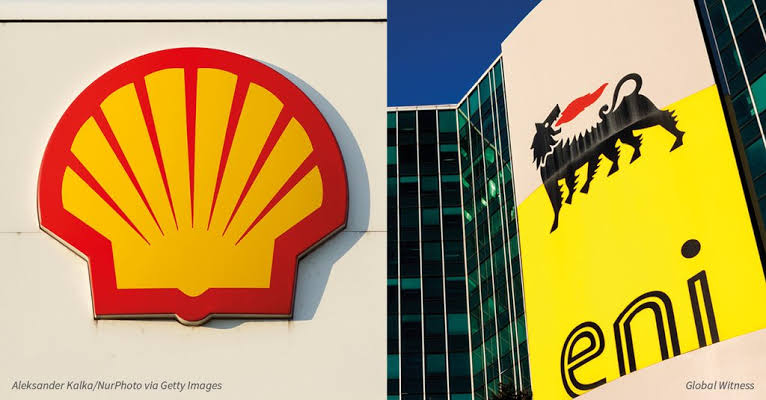Oil
Transparency International Seeks Reopening Of Eni, Shell Bribery Case

Transparency International, a global civic group, along with its chapters in the Netherlands and the United States, is urging authorities in both countries to reinitiate investigations regarding the involvement of Eni, an Italian multinational energy company, and Shell Plc, a British multinational oil and gas company, in an alleged oil bribery case in Nigeria.
It is worth noting that Eni and Shell were accused of making payments exceeding US$1 billion as bribes to certain individuals during the tenure of former President Goodluck Jonathan’s administration.
These alleged bribes were supposedly made in exchange for obtaining rights to the OPL245 offshore oilfield.
The case garnered significant recognition for its severe impact on the people of Nigeria.
Previously, both the United States and the Netherlands initiated investigations into the allegations. However, these investigations were subsequently closed due to an ongoing court case in Italy.
In a surprising turn of events, Italian authorities acquitted both Eni and Shell in 2021 and 2022, which caused a shock within the international community.
Transparency International further released a statement on Monday, characterizing the judgment as “Unfortunately part of a pattern in Italy, with both the OECD Working Group on Bribery and Transparency International’s own Exporting Corruption 2022 report finding the country to be limited in its enforcement against foreign bribery.”
But Transparency International stated that both the US and the Netherlands have an international obligation to punish foreign bribery, and therefore, must reopen the investigations.
The statement further reads “Now, reports that Nigeria’s attorney general advised the country’s outgoing president to drop the long-running dispute with Eni and Shell make the reopening of proceedings in countries that have jurisdiction over the case crucial for accountability.
“Simultaneously, the Civil Society Legislative Advocacy Centre (CISLAC) – Transparency International’s chapter in Nigeria – urges the Nigerian government to refrain from terminating its own disputes. It is estimated that the Nigerian treasury could lose as much as US$5 billion because of the poorly negotiated fiscal terms under the OPL 245 deal.”
Transparency International quoted the Executive Director of the Civil Society Legislative Council of Nigeria (CISLAC), Auwal Musa Rafsanjani, as saying that “Nigerians need answers. The outgoing government of President Muhammadu Buhari should reject calls to stop litigation over a deal that may have caused the Nigerian public an enormous loss.
“This is important especially as the current government has about a week before giving way to another administration. The incoming government must ensure that we get to the root of the matter.”
Oil
NNPC Targets 60% Methane Emission Reduction By 2031
The Nigerian National Petroleum Company Limited (NNPC) has unveiled a bold strategy to reduce methane emissions in the oil and gas sector by 60% by 2031, with an ultimate goal of achieving net-zero emissions by 2060.
This announcement reinforces Nigeria’s leadership role under the Global Methane Pledge initiative and its commitment to tackling climate change.
The Group Chief Executive Officer of NNPC, Mele Kyari, disclosed these plans during a meeting on Thursday with Robert Leahman, the U.S. State Department’s Global Methane Program Manager, and a delegation from Deloitte.
READ MORE: Atiku Gloats Over AUN’s Achievements Ahead Of 20th Anniversary
The discussions, held at the NNPC Towers in Abuja, focused on collaborative efforts to reduce methane emissions through innovative and sustainable practices.
“Reducing methane emissions is not just an environmental necessity but also a strategic imperative for Nigeria’s energy transition. We are leveraging partnerships to adopt global best practices and innovative solutions,” Kyari stated.
Key among these efforts is a pilot project in the Niger Delta, aimed at establishing emissions baselines, mitigating methane leaks, and promoting sustainable operations across Nigeria’s energy sector.
The project, a partnership between NNPC, Deloitte, and the U.S. Bureau of Energy Resources, will utilize data-driven methodologies to pinpoint and address methane hotspots.
Robert Leahman commended Nigeria’s proactive stance, describing it as a benchmark for other nations on the continent.
“Nigeria’s leadership under the Global Methane Pledge sets a standard for the continent. These initiatives will not only help reduce emissions but also drive sustainable development in the energy sector,” he said.
Kyari highlighted the broader benefits of addressing methane emissions, noting its significance for both environmental protection and economic efficiency.
“This collaboration is a game-changer. By addressing methane leaks, we’re reducing waste, saving costs, and protecting the environment. It’s a win-win for our economy and the planet,” he added.
Oil
FG Introduces New Incentives To Revitalize Nigeria’s Oil & Gas Industry
In a strategic move to revitalize Nigeria’s oil and gas sector, the Federal Government has unveiled two key fiscal incentives aimed at attracting investment and enhancing energy security.
The announcement was made by Mr. Wale Edun, the Minister of Finance and Coordinating Minister of the Economy on Wednesday.
The first initiative, the Value Added Tax (VAT) Modification Order 2024, introduces critical exemptions for essential energy products and infrastructure, including Diesel, Feed Gas, Liquefied Petroleum Gas (LPG), Compressed Natural Gas (CNG), Electric Vehicles, Liquefied Natural Gas (LNG) infrastructure, and Clean Cooking Equipment.
Read Also: Atiku Calls For Rotational Presidency Across Nigeria’s Geopolitical Zones
These exemptions are designed to reduce living costs for Nigerians, promote energy security, and accelerate the transition to cleaner energy alternatives.
The second initiative, the Notice of Tax Incentives for Deep Offshore Oil & Gas Production, offers new tax relief options for deep offshore exploration projects.
This measure aims to position Nigeria’s deep offshore basin as a premier destination for international oil and gas investments, boosting the country’s appeal to foreign investors.
These reforms are part of a broader set of policy initiatives, known as Policy Directives 40-42, endorsed by President Bola Ahmed Tinubu.
The directives reflect the administration’s commitment to fostering sustainable development in the energy sector and enhancing Nigeria’s competitive edge in the global oil and gas market.
Business
Tinubu set to approve ExxonMobil-Seplat oil deal, expands CNG bus initiative

By Yemie Adeoye
NIGERIA’s President Bola Tinubu has announced that the protracted ExxonMobil-Seplat upstream oil divestment will be formally approved by the Minister of petroleum within a matter of days, just as he announced his government’s intention to expand the Compress natural Gas, CNG buses initiative.
The President who stated this during his Independence day nationwide broadcast stated that the move is in line with his administration’s commitment to free enterprise, free entry and free exit in investments which is the hallmark of his administration investment policy.
“Fellow compatriots, our administration is committed to free enterprise, free entry, and free exit in investments while maintaining the sanctity and efficacy of our regulatory processes. This principle guides the divestment transactions in our upstream petroleum sector, where we are committed to changing the fortune positively. As such, the ExxonMobil Seplat divestment will receive ministerial approval in a matter of days, having been concluded by the regulator, NUPRC, in line with the Petroleum Industry Act, PIA. This was done in the same manner as other qualified divestments approved in the sector.”
The President also seized the opportunity to plead with Nigerians to be patient with his administration’s reform policies. “As your President, I assure you that we are committed to finding sustainable solutions to alleviate the suffering of our citizens. Once again, I plead for your patience as the reforms we are implementing show positive signs, and we are beginning to see light at the end of the tunnel”.
“Our energy transition programme is on course. We are expanding the adoption of the Presidential Initiative on Compressed Natural Gas for mass transit with private sector players. The Federal Government is ready to assist the thirty-six States and FCT in acquiring CNG buses for cheaper public transportation.
Fellow Nigerians, while we are working to stabilise the economy and secure the country, we also seek to foster national unity and build social harmony and cohesion. Our economy can only thrive when there is peace”. he enthused.






















